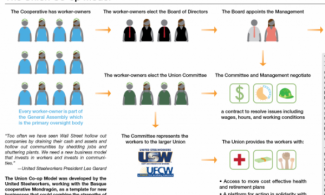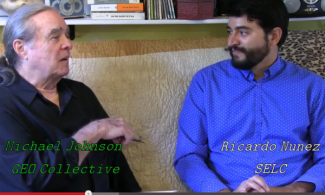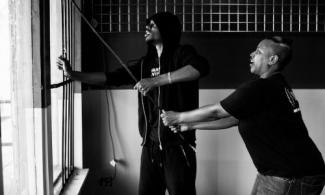WHO ARE "WE" - 1.
Over the past year or so I have begun wondering about my political identity. My involvement with the various movements that GEO has begun referring to as “co-operative/solidarity economics” hasn’t changed at all. However, it seems to me that all of these diverse movements are part of something larger, and I am trying to figure out what that “larger” is. The broad range of issues that connect seriously with race/ethnic, gender, and class divides are becoming, in my mind, more and more inseparable in so many complex ways. And in very deep ways as well.
The seeming meltdown of the Republican party and watching the Democratic presidential debate last week reinforced my wondering. Just the fact that I have begun to pay more attention to that mainstream realm of politics is a measure of what is shifting within me. I am realizing that the underlying stability of that realm depends on a stable Republican party, and that the overall political stability of our country depends on the stability of that realm.
Our movement-of-movements out, located primarily out on the far Left fringe is very connected to that realm. It is our large context. Far more than that actually. It’s deep inside us as well. Whatever feelings I/we may have about “national loyalty,” or however “alienated” we may experience ourselves from our mainstream realm, we are of this culture. We are Americans. And I haven’t had a sense of that way in a long, long time. These are not at all strange thoughts and feelings, but they feel as if they have been stored in my attic for a long time.
So we have the party of the Right fragmenting dramatically as that dog’s extremely anti-government tail is now wagging it. The 1% is spending money maniacally in order to dominate our mainstream politics. Last week’s Democratic presidential candidates debated each other in the most “liberal” or “progressive” language since 1972 (with the big exception of Jesse Jackson’s run in 1984). Nothing specific during those two hours aroused any particular political passion in me. However, I came away from it with three strong feelings (the third being the most important one), and a very fundamental question stirring within me.
First, there is some way that I “belong” with those Democratic politicians, even Hilary. They were having a kind of “family” conversation I could identify with even though there was no real space in it for co-operative/solidarity political economics and my “becoming the change” project. (See my last two blogs—here and here—where I described the split-level conversation Black Lives Matter folks and Hilary engaged in a few weeks ago.) Still, they were exciting me in a significant way. A sense (or maybe only a fantasy) that the seeds of the “Occupy Moment” have been germinating and are now beginning to flower on influential levels. That there is reason to believe that, in some interesting ways, “we” as a nation are emerging from our long nightmare.
Second, I have begun to feel a kind of kinship with the Main Street Republicans. That’s not new for me, but it had faded far away. There is a new hope that they can again be “distant cousins,” if they can emerge out of the dark irrationality their party has descended into over the past 30 years or so. We are miles apart in many ways, but I would like to welcome them back if they do emerge. I can sense a common interest in that, in spite of huge differences, we both want some kind of reason and compassion to prevail in our governance.
Third, and most important, maybe a new political-cultural landscape has emerged. Roughly speaking, something like this:
- a Far Right, radical in its anti-government, enraged with the disappearing of the ole White America, well-funded, and skilled in political manipulation;
- a voracious and powerful 1% wanting all it can get;
- Main Street conservatives, some feeling a lot of pain and some not so much, but wanting things to be steady;
- Main Street liberals, some feeling a lot of pain and some not so much, but wanting things to go much better than they have been going;
- an emboldened Progressive Left, now seriously asserting itself within the Democratic Party, and
- “us” out here on the Far Left, radical in our political economic visioning, persistent, frustrated, poorly funded, and with no significant political base.
This is little more than a very rough sketch, so don’t take it literally. Either you can sense what I am getting at, or you don’t. I am trying to find words and pictures for articulating a strong sense of what seems to be happening. Something big is shifting in our country, and it is making me ask where the center of my political identity is in this country. It’s the “in this country” part that hasn’t been around for me for a long time. Co-operative/solidarity political economics is the core of my political identity, but I am wondering now where that core is actually situated in the political world I was born into, the USA.
When I turned 26 in early 1968 I found myself outside mainstream American politics, what we called “the establishment.” By the end of that year I had also moved far away from the Far Left, what we called “countercultural” politics back then. What followed is what I often refer to as “my forty years in the in the desert wandering in search of a political home.” By 2009 I had integrated decades of experience, experimenting, and thinking into the core of my political identity and had found my “political home.”
What I am now realizing is that even with that personal achievement I am still something of a political identity without a country. For example, I didn’t really experience 9/11 as an “American.” Yes, all of my activism has been here in the US, but I never emotionally situated that work and passion into my identity as an “American.” In fact, I think I tended to operate as if I just happened to be here in this country, and so I had to live out my political passion in these circumstances. But, the fact is, I am totally American. Down into every cell of my body. There is no way I could be otherwise. So, it is seeming necessary for me to situate my political being in my homeland, or remain mostly ungrounded politically.
Yes, in 2009 I had reached a co-operative/solidarity place where I was no longer politically homeless, but that home still left me quite politically alienated from the culture I embody. Obama’s election in 2008 almost re-connected me, but all of that began dissolving with his appointment of neo-liberal economic advisors and his flattening Inaugural speech. Then, it all went down the drain when he disbanded the grassroots organization he had put together for his election.
Now I am beginning to sense that a new ground has begun to form with the radical right imploding the Republican Party and a Democratic Party surging leftwards. Something deep is shifting in this country, beginning with the “Occupy Moment” and picking up steam with the impact of Black Lives Matter. Not something miraculous, but something larger and with a greater life expectancy than the next election. So I am now asking myself, “With whom do I belong in this homeland I am both so much a part of and so estranged from?”
Asking this immediately raises one fact and one strong possibility. I cannot ask that question just by myself, and we of this Far Left movement of movements, may not need to see ourselves as huddled alone on a far out edge of our political landscape. It could very well be that we can be part of something “more” here at home.
If so, who is that larger “we” that can better ground us here in our homeland?




Add new comment